'He goes uphill faster than we go downhill': Meeting Tadej Pogačar's parents
What made Tadej Pogačar the phenomenon he is today? Chris Marshall-Bell went to Slovenia to meet his mum and dad, Mirko and Marjeta
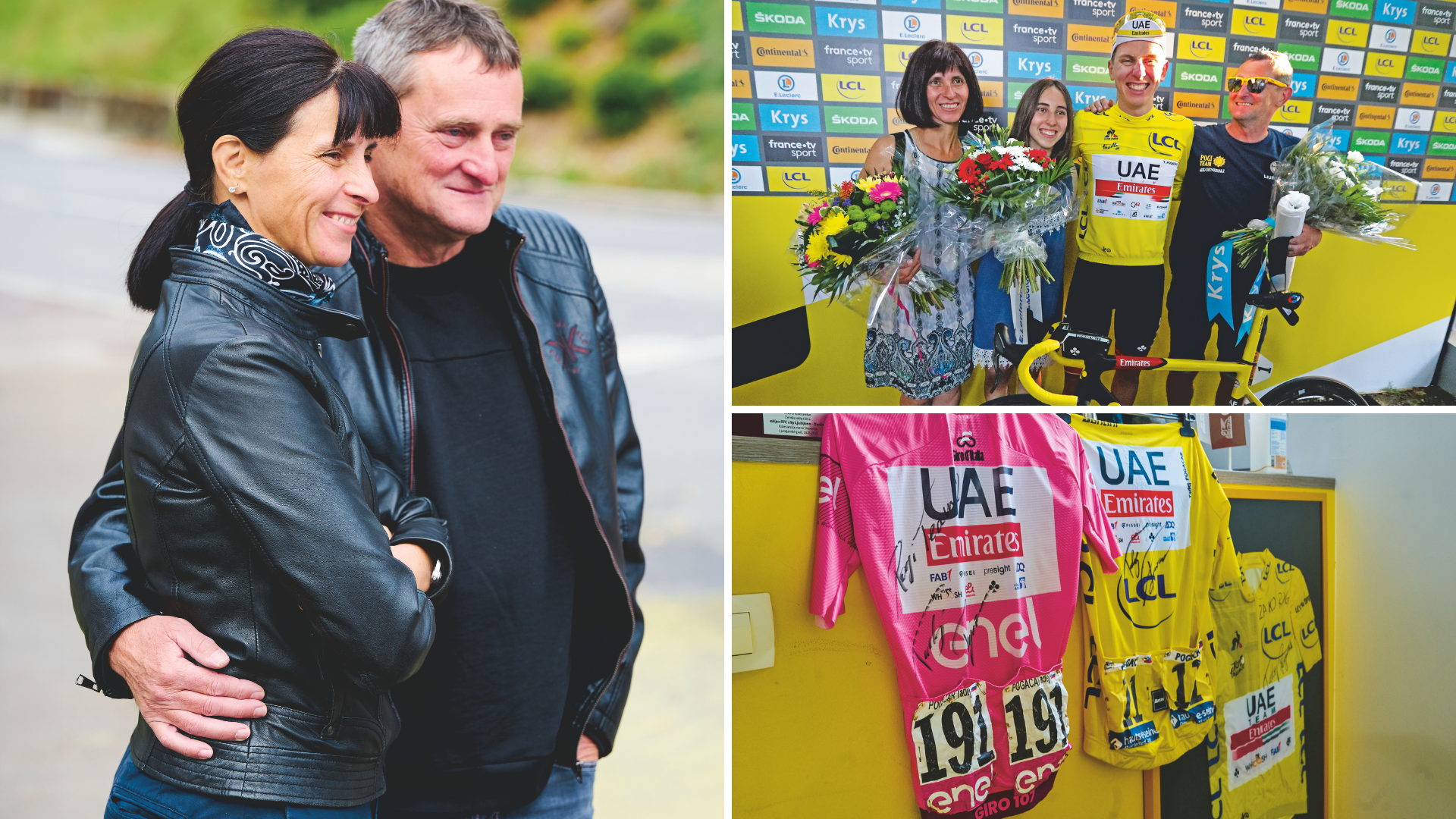

Tadej Pogačar was very impressionable as a young child. Whenever he was introduced to a new sport or activity, he was curious about it and wanted to know more. Like the first time he saw someone on a unicycle. “There was a guy in the neighbourhood who had a unicycle, and one time he came to an event with it,” his mother Marjeta tells me in a spacious cafe in their home town of Komenda, 20km from the Slovenian capital of Ljubljana.
“He showed people how to ride it and our kids were really interested. They wanted to learn, so we bought them one.” Sibling competition soon called for the purchase of a second unicycle, and in no time the 10-year-old Tadej and his older brother, Tilen, were regularly riding around the small town of 6,000 people on one wheel. “If you gave them a unicycle now, they could still ride it. They were always practising,” Marjeta adds.
Unicycles aren’t often thought of as cargo bikes, but the brothers would even ride them to their paternal grandparents’ farm to collect milk. “When we’d tell Tadej and Tilen to go fetch some milk, they’d say: ‘It’s too hard to walk. It’s easier to go by bike,’ so they’d go by unicycle,” Marjeta laughs.
You might think a career in the circus was beckoning to Tadej at this point, rather than one in the WorldTour – but his one-wheeled fun was brought to a sudden halt. “They rode them until one day the unicycles were stolen,” Marjeta says, then pauses, a wry smile forming. “Or they lost them. We don’t know. All we know is that we had two, and then they were both gone.”
In the two decades that have followed, Tadej Pogačar has developed from a unicyclist into arguably the greatest two-wheeled bike rider of all time. When he was a child, his parents could not have imagined such a trajectory, but a life of sport was guaranteed. “Tadej was always active,” Marjeta says. “If there wasn’t enough action, he’d make some. He would always find ways to have fun with his brother and sisters.”
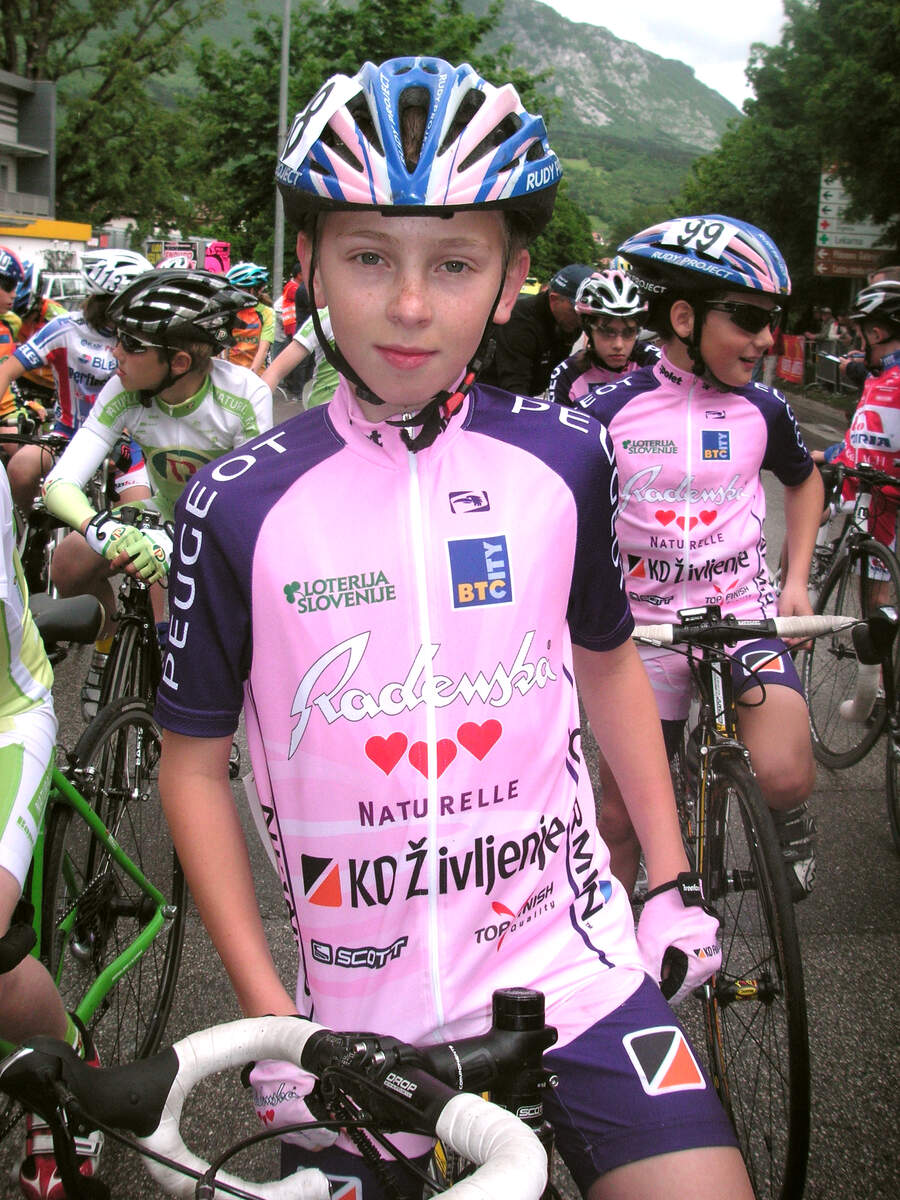
Young Tadej was always active
Marjeta, who is 55, taught French at school and her husband, 62-year-old Mirko, Tadej’s father, was the manager of a chair factory; this summer both quit their jobs to focus on running the Tadej Pogačar Foundation. I am meeting them in a cafe along with Tadej’s first coach from local club Rog Ljubljana, Miha Koncilija. They pull into the car park in a small green Nissan – I had half-expected a flashy, blacked out 4x4 paid for from Tadej’s evergrowing riches. A tiny ‘TP’ signature on the bonnet, their famous son’s foundation logo, is the modest car’s only identifying feature.
Both are dressed in black leather jackets, and it is Mirko who first greets me with a warm smile and handshake. It’s soon clear, though, that Marjeta will be the family’s spokesperson. “Are we going inside?” she asks, looking up at the gloomy sky. Once seated, Marjeta is immediately chatty and comes alive with anecdotes – it’s obvious who Tadej takes after – describing the makeup of their family. “We have four kids, two girls and two boys,” she says, her hands clasped around a mug of fruit tea. “The oldest, Barbara, is an electric engineer now; Tilen, the second oldest, was a cyclist at a Continental level and now works in logistics; then there’s Tadej; and Vita, Tadej’s little sister, eight years younger than him, is in her last year of secondary school.” A busy house, then? “A noisy house,” Marjeta corrects me, “and Tadej was a kind of clown at home.”
Get The Leadout Newsletter
The latest race content, interviews, features, reviews and expert buying guides, direct to your inbox!
Slovenian upbringing
Komenda is like so many other Slovenian towns: the Julian Alps dominate the horizon on one side, with rolling green hills on the other. A baroque church is the locality’s focal point, and most of the houses back on to farm land. Access to greenery is plentiful and it sounds as though there was never a boring day in the Pogačar household. “We were always playing together with our children: sports, cards, board games, dice games, going to Mirko’s parents’ farm to pick potatoes,” Marjeta says. “The boys would play with Pokemon, Lego and Beyblades too.” There was one thing the boys weren’t interested in, though: learning French. “I understand why,” Marjeta says. “It’s because when they were naughty I’d start speaking to them in French, so when they heard French, they thought, ‘Uh-oh, we’ve done something wrong.’”
If ever there was a strained atmosphere at home, Tadej would be quick to lift the mood. “He always tried to cheer us up or make everything better,” Marjeta says. “He’d always do something to calm the tension.” I interject to suggest that perhaps he was born with natural leadership traits. “We never saw him as a leader,” Marjeta says, looking over to Mirko, who shakes his head in agreement. “Perhaps he is a leader, but in a way you can’t feel it. He’s not saying, do this, do that, but he will always do whatever needs to be done. If I asked who would fetch the water, he would say, ‘I’ll do it.’ He has always been like this, an example to the others. He bonded the family together, as he does his team now.”
Tilen, two years older than Tadej, was the big brother who the would-be champion looked up to. “Tilen started football, so Tadej did too,” Marjeta says. “But when Tilen saw that Tadej was doing really well, he left the team to join a basketball team.” Tadej persisted with football for a while, but Marjeta was happy when he gave it up. “The atmosphere around the ground with the other parents was really unkind, quite aggressive and I didn’t like it,” she says.
Fortunately for Marjeta, the family’s cycling chapter was about to open – thanks to the man sitting alongside them, Miha Koncilija, the coach at the local club. When Tilen was 11, Koncilija – a former student of Marjeta’s – visited the children’s school and put everyone through a two-minute cycling test.
Tilen’s result was “very good”, Koncilija recalls. “We didn’t have many kids in the club, and I told Marjeta and Mirko that it’d be nice if Tilen started training with us.” The older brother did exactly that, and six months later nine-year-old Tadej joined him – and was provided with a green Billato bike, which Koncilija admits was too big for him. “We had nothing smaller!”
The family did not have the means to kit out both sons. “We were very happy that they both started cycling but it wasn’t cheap,” Marjeta says. “We were very lucky that the club offered the bikes, shoes and helmets, otherwise it was too expensive and we wouldn’t have been able to afford it.” Never before have hand-me-downs graced such promising shoulders, I joke. “Cycling was the most important thing in the world for Tadej,” Marjeta says. “He always spent what pocket money he had on sunglasses, socks or wheels. He’d get €5 or €10 for winning a race when he was 12, and that increased when he got older – before long, he could afford whatever he wanted.”
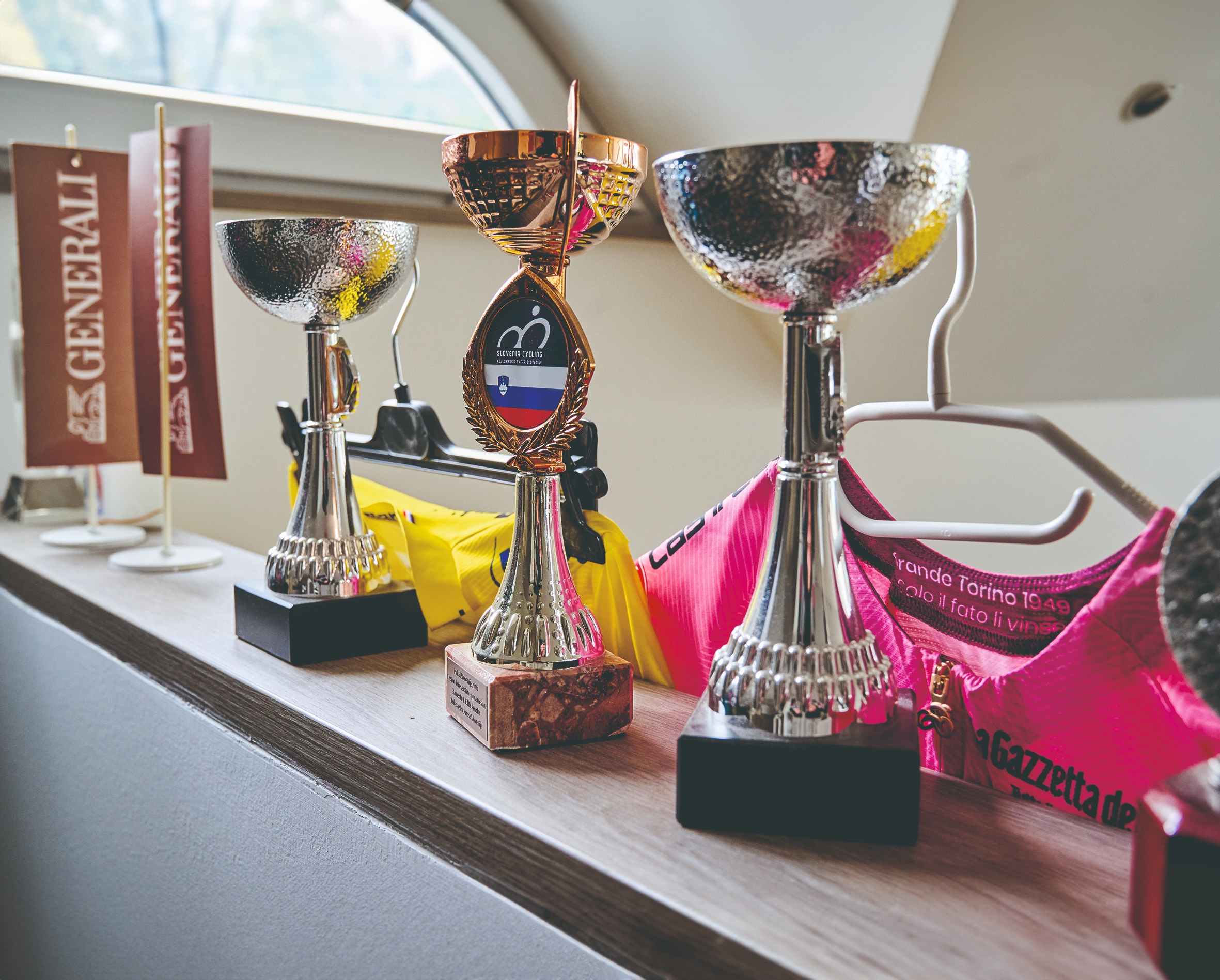
Slovenian trophies are among the collection
Aged 11, Tadej rode up his first mountain, Krvavec, a ski-station road (11.7km at 8.3%) visible from the family’s back garden. “It was the only time there’s ever been an U12 race on the climb,” Koncilija says, “and that was where we saw,” he pauses as if replaying the race in his mind. “OK, he’s special, we said.” Tadej took his first win – and immediately wanted more. “He loved to race, to beat others – it was a deep passion that he still has now,” adds Koncilija. Did he get his bike skills from his parents? “No, no,” laughs Marjeta. “We take mountain bikes to the Tour de France to ride up climbs not accessible by vehicle, but he goes uphill faster than we go downhill.”
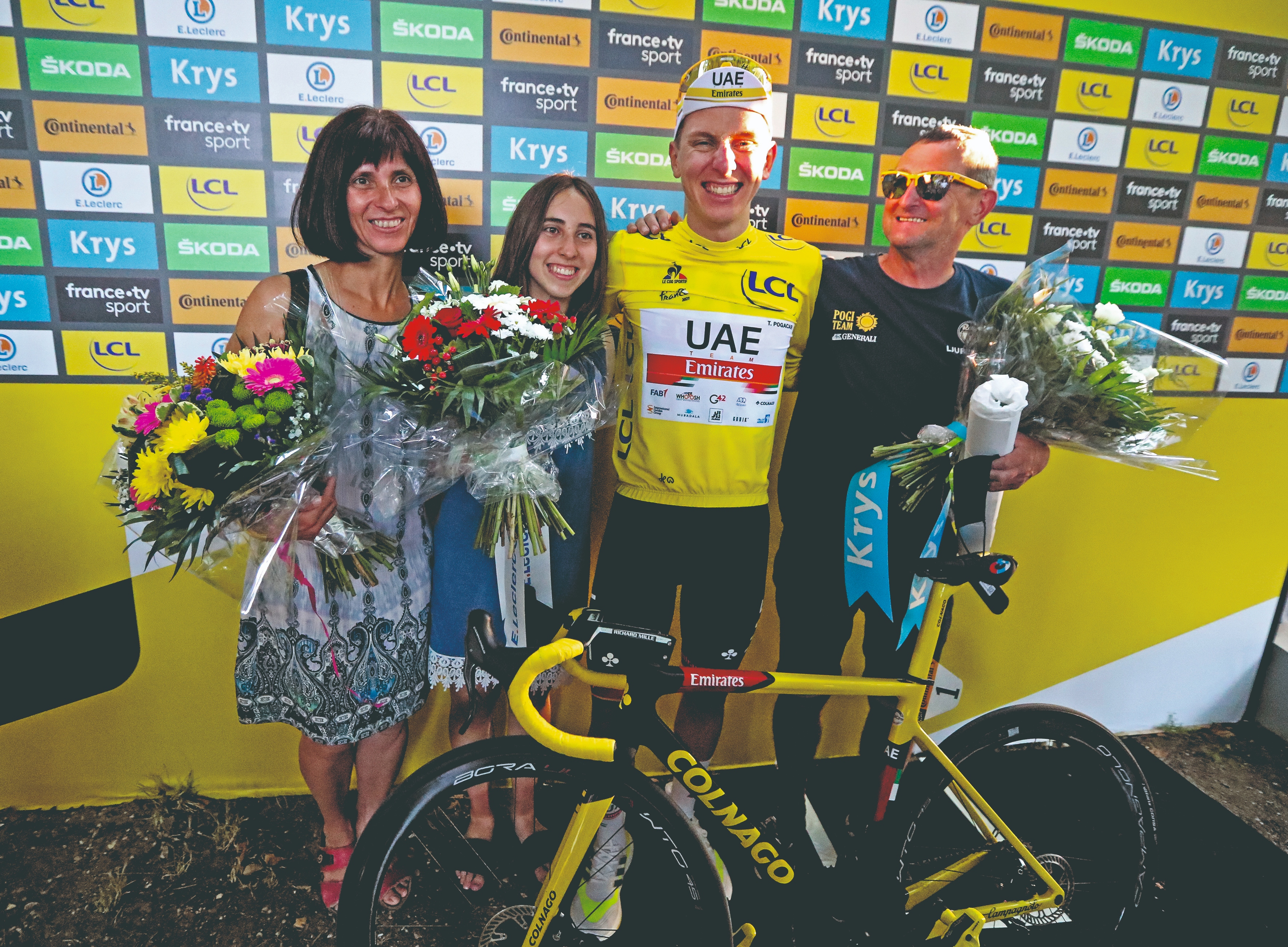
Tadej celebrates his 2021 Tour win with Marjeta, sister Vita and Mirko
The first time the Pogačars saw the Tour in real life was by accident. “We hadn’t meant to see the race – we were trying to get to Lyon!” Marjeta explains their encounter with the 2011 race. “The tunnel into France from Italy was too expensive, so we went via Sestriere. But as soon as we got there, the road was blocked for the race and we had the opportunity to see the stage. It was the best day of our holiday.”
Inspired by his heroes – Alberto Contador and Andy and Fränk Schleck, especially – Tadej got a foretaste of his future. “When he was 14, he said he wanted to race the Tour de France and that he’d do everything to achieve this goal,” Marjeta says. “I tried to ground him – we wanted him to finish his secondary school so he had a profession, but school wasn’t very important to him. When he had to choose a programme [to study between 15 and 18] he chose machinery, as that wasn’t very demanding.”
Forever joking and laughing, Tadej was popular with his classmates and subject to the typical teenage temptations. Did he succumb? “He went to one or two parties of his schoolmates, but that was it,” says Marjeta. “He didn’t have time! He’d say, ‘I have a race, I have to train, I can’t go.’ He didn’t drink alcohol often – he was really focused on cycling.”
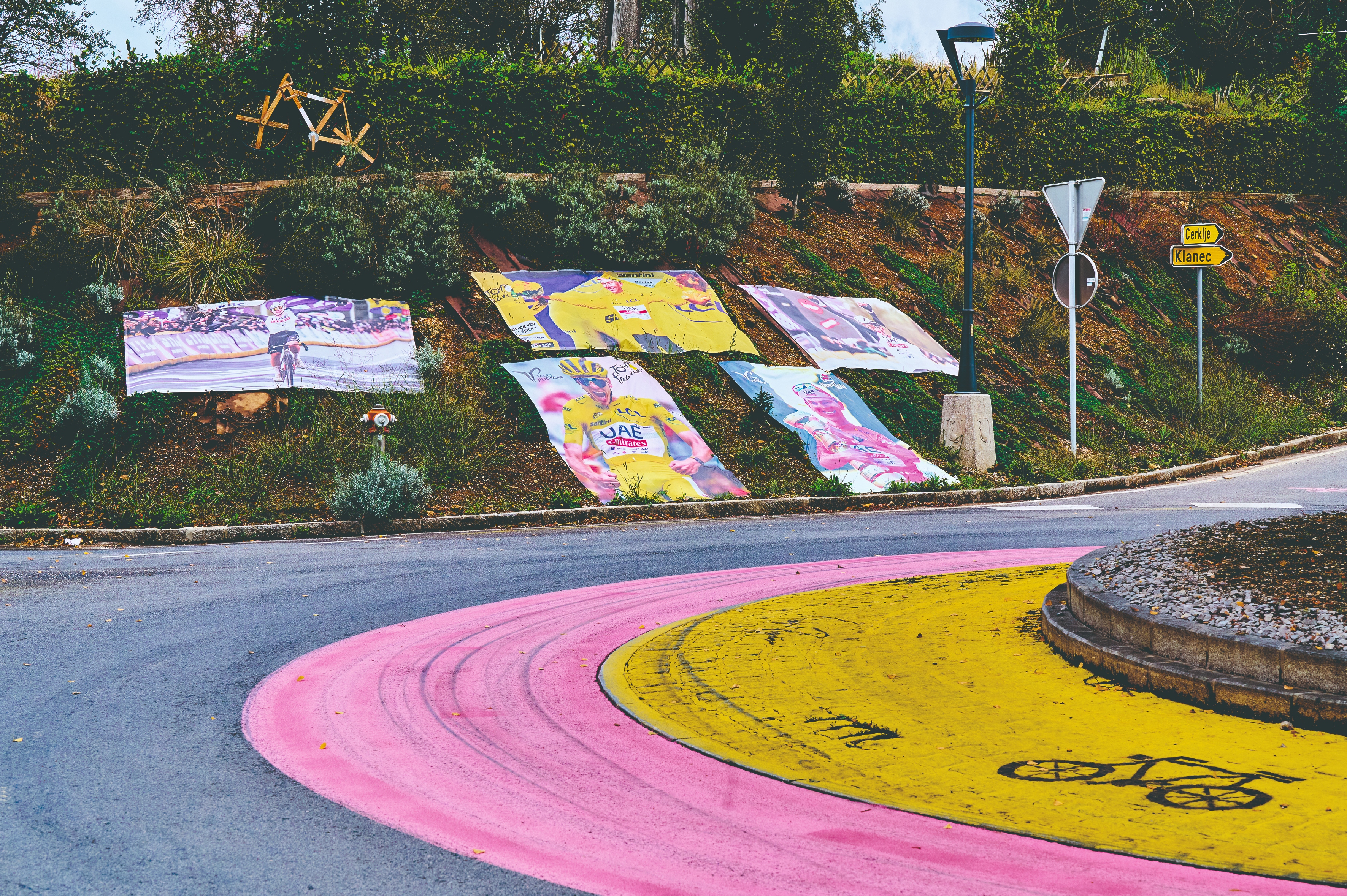
An anonymous roundabout in Komenda celebrates all the colours of Tadej’s success
I realise we’ve been chatting for almost an hour – time has flown by. Our drinks are empty, and the cafe is filling with construction workers on their mid-morning break. Marjeta, Mirko and Koncilija briefly confer between themselves in Slovenian. Marjeta turns to me: “Do you know about the museum?” No, I reply. “OK, come with us, first to the roundabout, then we’ll tell you where the museum is.” I jump into our hire car with CW’s photographer and we follow the Nissan for five minutes until we reach a roundabout, which evidently doubles as a Pogačar shrine.
“Here it is,” Marjeta sniggers, shyly but proudly. Several posters of their son are displayed on all sides; the centre of the roundabout is painted in concentric rings of yellow and pink; and Tadej’s signature is stencilled on the road, spray-painted by the man himself. “Every day there are people from Italy, Spain, Belgium here,” Marjeta says.
As if to prove the point, a British woman who has been taking photos overhears our conversation. “I’m terribly sorry, but could I ask you two for a photo?” she politely asks. “I’m a huge fan of Tadej.” Marjeta and Mirko willingly pose, clearly used to being minor celebrities thanks to their son.
Same family home
Has it changed them? “I don’t know how we could change,” Marjeta smiles. “We have a normal life and work, just like before.” The family house, a two minute pedal from the roundabout – or 30 seconds for Tadej – will remain home. “I sometimes joke that if we don’t have enough money to pay for things when we are old, we will sell the house and move to a smaller apartment that costs less,” Marjeta says. “But all the children say: you will not sell our house.”
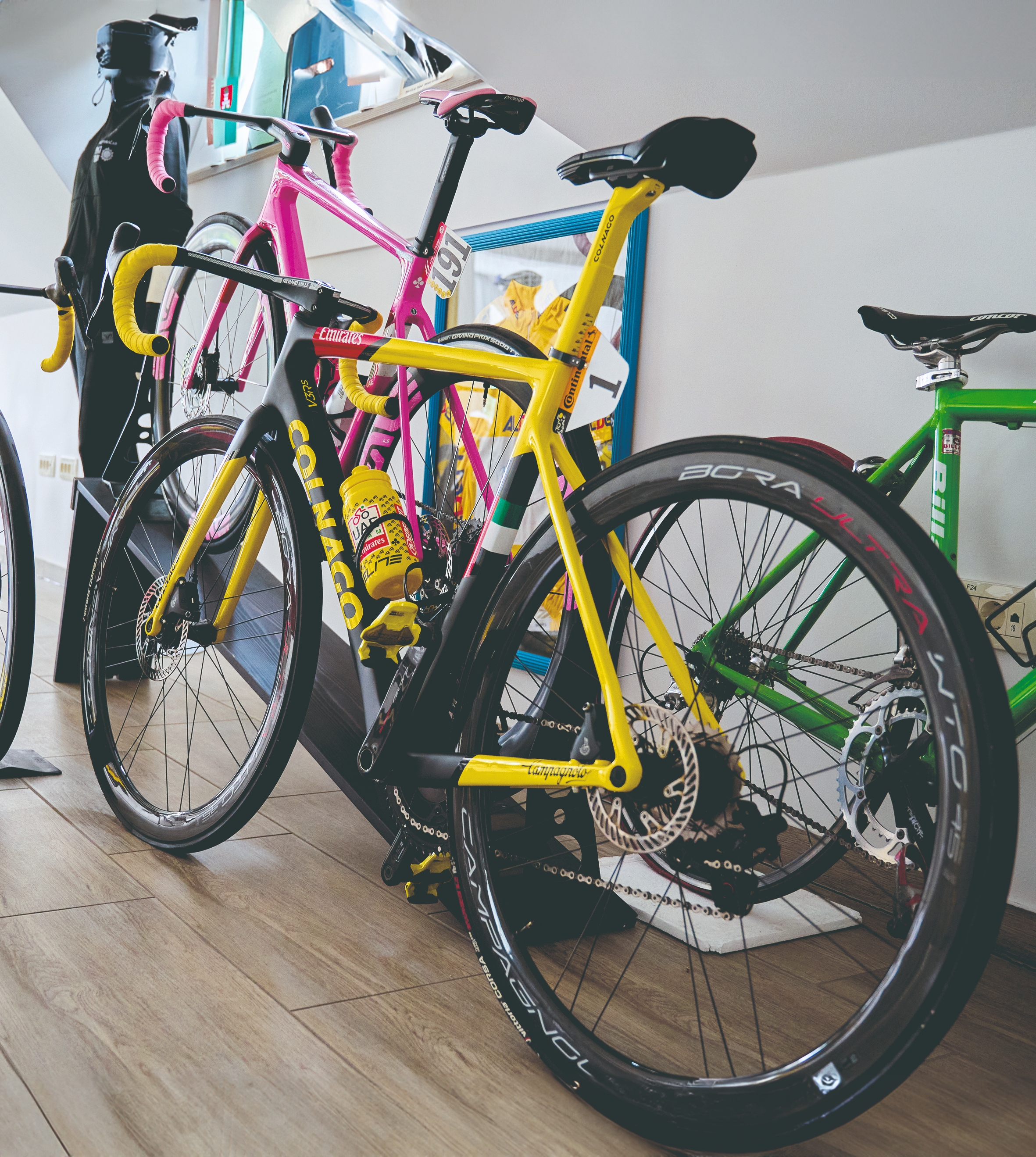
Winning bikes are on display
If the house and its memories are too precious to separate from, then the collection of Pogačar memorabilia, stored 30 minutes away in the headquarters of the development programme Pogi Team (rebranded from Rog Ljubljana Cycling Association in 2021), are literally priceless.
The bikes Tadej rode in the Tour de France, Giro and Tour of Flanders, among others, sit alongside race leader pink and yellow jerseys. There are countless trophies, too. This attic is to a cycling fan what the Louvre is to an art-lover, and there have been discussions to eventually turn this private collection into a public museum in Ljubljana.
Tadej Pogačar is still amassing the treasures that will one day be curated and exhibited. The tufty-haired mischievous boy who followed in his brother’s footsteps as a young child has ambitious plans to win all three Grand Tours multiple times, tick off all the Monuments, claim all seven of the big one-week stage races – to basically win everything in cycling.
Is he the greatest cyclist in the history of the sport? “For us, we don’t look at him as the best cyclist in the world; he’s our son,” Marjeta answers, again turning to Mirko, who nods. “To us, he’s the same as our other kids,” she continues. “I often say to the other children that they are also the best in what they do. Sometimes it’s quite diffi cult for them because they say they’re not as worthy as their brother, but that’s wrong – they have the same value as him. “To us, he’s simply our son and will always remain our son.”

Thank you for reading 20 articles this month* Join now for unlimited access
Enjoy your first month for just £1 / $1 / €1
*Read 5 free articles per month without a subscription

Join now for unlimited access
Try first month for just £1 / $1 / €1
A freelance sports journalist and podcaster, you'll mostly find Chris's byline attached to news scoops, profile interviews and long reads across a variety of different publications. He has been writing regularly for Cycling Weekly since 2013. In 2024 he released a seven-part podcast documentary, Ghost in the Machine, about motor doping in cycling.
Previously a ski, hiking and cycling guide in the Canadian Rockies and Spanish Pyrenees, he almost certainly holds the record for the most number of interviews conducted from snowy mountains. He lives in Valencia, Spain.
You must confirm your public display name before commenting
Please logout and then login again, you will then be prompted to enter your display name.
-
 'It took everything' - Puck Pieterse outclimbs Demi Vollering to win La Flèche Wallonne
'It took everything' - Puck Pieterse outclimbs Demi Vollering to win La Flèche WallonneDutch 22-year-old shows Classics pedigree with first one-day victory
By Tom Davidson
-
 Tadej Pogačar flies to dominant victory at La Flèche Wallonne
Tadej Pogačar flies to dominant victory at La Flèche WallonneSlovenian takes second win at Belgian classic ahead of Kévin Vauquelin and Tom Pidcock
By Tom Thewlis